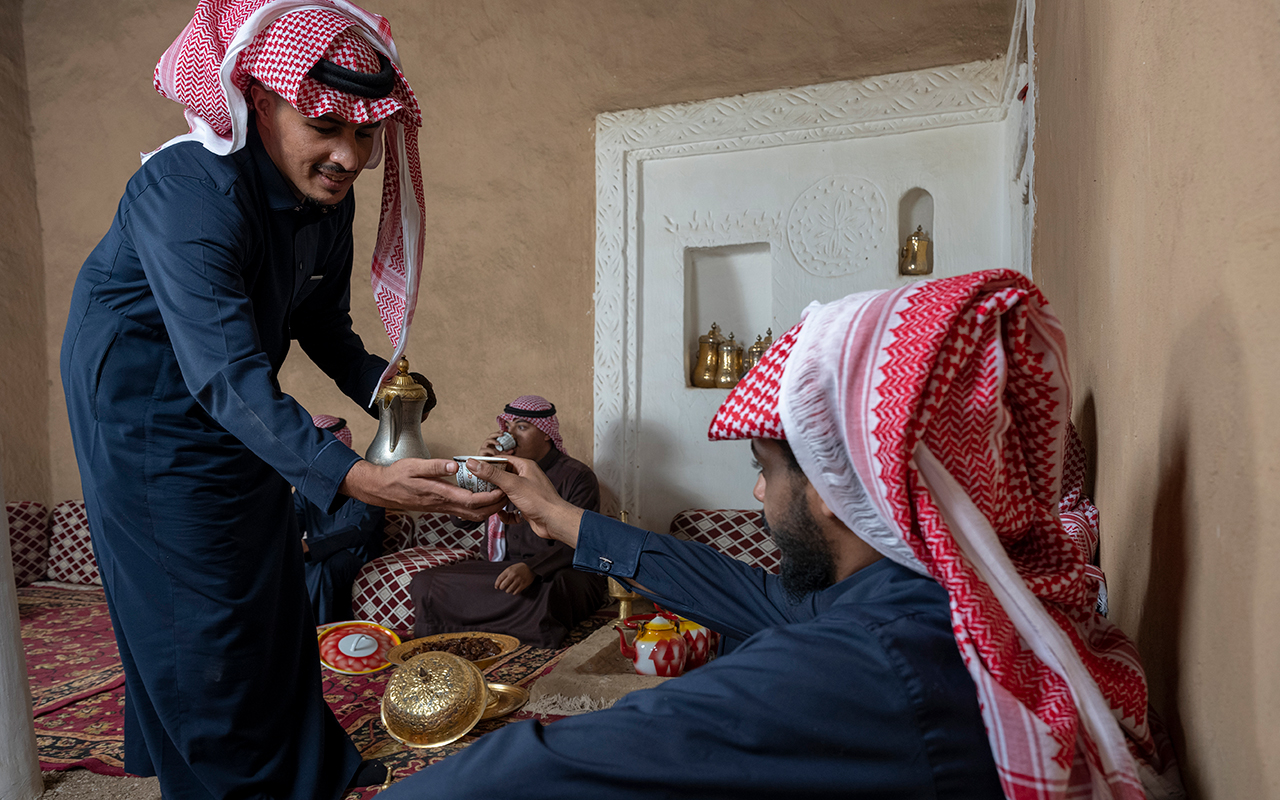Hospitality in Saudi Arabia
Hospitality in the Kingdom of Saudi Arabia is one of the strong and unconditional human bonds that remained embedded in the Arabian Peninsula over centuries. It is an Arabic and mainly Islamic concept. It is valued by the Saudi society. Hospitality is perceived by all Saudis as a human virtue that must be honored. It is often viewed as a competition to welcome and entertain guests, whether acquaintances or strangers, in the most remarkable way.
The modern meaning of 'guest' and 'visitor' differs from the eloquent etymology of the Arabic word. A guest is originally a traveler who passes by without an invitation, and is hosted by the people of the region, thus becoming a guest. In Saudi culture, every unexpected visitor is considered a guest. On a governmental scale, the same concept applies for welcoming pilgrims and Umrah performers who are known as Doyof Al Rahman (Guests of Allah). The word hospitality is the social root of two main roles. The first is the host who welcomes guests and is responsible for hospitality. The second is the guest who is invited or welcomed.
Hospitality Rules in Saudi Arabia
Throughout the different cultures of hospitality in Saudi Arabia, the guest is always expected to adhere to and respect specific rules of behavior in each culture. In return, the host must anticipate the guest’s needs and meet them as much as possible. If the guest was a traveler, the host should provide them with food and shelter, and protect them from harm. People who provide a high level of hospitality are extremely popular in their regions, and some try convincing gestures on strangers to sway them into accepting their invitation.
Generosity in Saudi hospitality
When traveling to Saudi Arabia, any tourist will encounter residents who attempt to welcome them in their home and insist on their visit without expecting a reward for that initiative. The host will repeatedly ensure to the guest that the food preparation will require no hassle, which is a part of the hospitality etiquette. Nonetheless, the guest can expect a lavish feast to dig into. Saudi cultures vary but do not differ in terms of showing hospitality to strangers, since they treat the guests, even if they were outsiders, the same way they would their friends and acquaintances.

Hospitality protocol in Saudi Arabia
The official hospitality protocol in Saudi Arabia begins with coffee, and ends with a basic meal that may expand into a feast, which usually consists of a lunch, dinner or both.
Hospitality in Saudi Arabia does not follow strict conditions, and was mostly formed through simple lifestyles across the regions. For instance, some provinces fill coffee cups to display generosity and abundance in giving. In contrast, the amount of coffee in other provinces does not exceed a quarter of a cup, which indicates the host’s desire to spend more time with their guests by making them stay longer. In both cases, the amount of coffee poured should not surpass the point from where the guest holds the cup.
The prevailing hospitality customs in Saudi Arabia
One custom prevails in all Saudi regions, which prevents the host from eating before the guest. Moreover, the host should not look at the guest while the latter is eating to prevent any embarrassment. After the host is full, they should not leave the table before the guest, which pushes the host to eat slowly to avoid showing any signs of satiety before the guest has finished. These are all customary habits to make the guest comfortable.
Sources
.Princess Nora bint Abdulrahman University
.The Unified National Platform.
Digital Library of Dr. Faisal bin Mishaal bin Saud bin Abdulaziz.
.